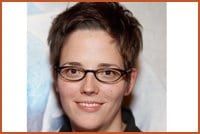When Sara Bannerman started her PhD at Carleton, she wanted to meet other queer grad students. But while Carleton offers a GLBT Centre for students, she found it wanting for her needs.
“We’re older first of all,” Bannerman says. “Most of us have been through our coming-out process, or more of us than the undergraduate population, so we have just different interests and different things we want to do.”
While queer grad students have always been welcome at the Pride/GLBT Centres of the University Of Ottawa and Carleton University, it wasn’t until 2004 that there was an actual group devoted to them.
Bannerman started the group last September using an e-mail listserv, advertised by postering at the queer centres of both universities, and in a single year has signed up over 100 students. The Grad Group meets socially every couple of weeks, usually for pub nights, movie nights, dessert nights and the like. The group is a blend of both men and women, and Bannerman sees it as a good chance for students from both universities to mix.
“I don’t think that grad students are as interested in going to discussion groups and that kind of thing, but pub night seems like the right kind of thing for a grad group, something a little more purely social was what I was more interested in doing at least to start off with.”
But shouldn’t a group that represents the intelligentsia of tomorrow be about more than just pub nights?
Bannerman hopes that there will be interest in creating a queer study group or a queer theory group within the Grad Group, but feels that they haven’t achieved the proper momentum for this to occur yet. But it’ll happen one day, she predicts, and she feels the discussion could go beyond basic queer issues.
“I think it’s part of the academic position to play this kind of political role, to get a little bit political — for a lot of academics it is an important component of their work,” Bannerman says. “I think that people in the group are political, and it’s not necessarily in the realm of sexual orientation or gender orientation.” She lists off some of the areas of study that members of the Grad Group are involved with, such as English-French relations in Canada, and race relations, as well as the intersections between race relations and gender or sexual orientation.
“I think that once you start announcing the topics, people will start to come,” she says. “You just have to try it — that’s how the interest in these topics gets generated. People can support each other in their study in that area and network.”
Bannerman, whose area of interest lies in copyright, feels that she isn’t the right person for that particular job, despite some of the work she did with same-sex marriage and representation in the media. She is hoping that someone who is more qualified in leading discussions on queer theory and its various intersections with other areas of study will step forward to create a discussion group.
For the moment, Bannerman’s eager to see what the group will bring this year.


 Why you can trust Xtra
Why you can trust Xtra


